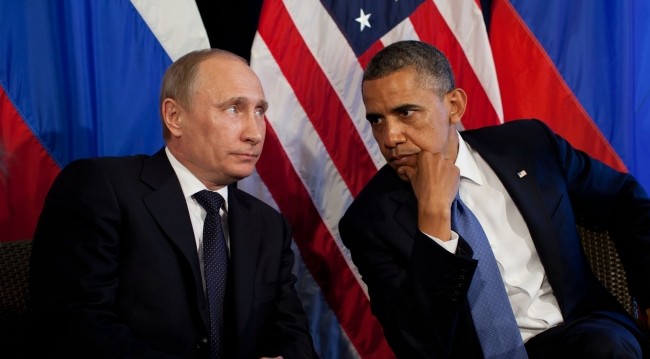 President Barack Obama’s 15 seconds of face time with Russian President Vladimir Putin on Thursday, while American and Russian warships patrolled the eastern Mediterranean, spoke to a deep chill that has created one of the biggest complications to the U.S.’s plan to strike Syria.
President Barack Obama’s 15 seconds of face time with Russian President Vladimir Putin on Thursday, while American and Russian warships patrolled the eastern Mediterranean, spoke to a deep chill that has created one of the biggest complications to the U.S.’s plan to strike Syria.
Mr. Obama used the opening day of a Group of 20 meeting in St. Petersburg to press his Syria agenda, speaking for an hour with Japan’s prime minister. With Mr. Putin, the summit’s host, he simply shook hands and smiled for cameras, with no further meeting plans scheduled.
Their tense standoff, in many ways, is the outgrowth of previously undisclosed calculations about the level of U.S. interest in the civil war in Syria. In early 2012, White House and State Department officials asked themselves what the U.S. might be willing to do to wean Russia from its support of Syrian President Bashar al-Assad. Curtail missile defenses in Europe? Pare plans to enlarge the North Atlantic Treaty Organization?
Their conclusion: These initiatives weren’t worth sacrificing for a deal on Syria, which was then lower on the foreign-policy priority list, say current and former officials who took part in the brainstorming exercise. Likewise, officials doubted such a gambit would work with a Russian leader whose motivations have confounded the U.S. . . .
U.S. officials haven’t found it easy to get a handle on Mr. Putin or his motivations. While anti-Americanism has been a key theme for Mr. Putin, the U.S. expected he would dial back the rhetoric once he had cemented control after the 2012 elections, a prediction that proved unfounded.
Mr. Obama’s attempts to make a personal connection, such as complimenting Mr. Putin’s judo skills during their last meeting, have fallen flat. Offhand comments, such as Mr. Obama’s recent comparison of Mr. Putin to a “bored kid at the back of the classroom,” rankled in Moscow.
The Central Intelligence Agency’s classified personality profile of Mr. Putin, prepared by the agency for Mr. Obama and other policy makers, says he was bullied in his youth. It also describes Mr. Putin as insecure, according to American officials who have read it.
Russian officials dismiss such suggestions as cheap psychology.
Image: Russian President Vladimir Putin and President Barack Obama, June 22, 2012 (photo: White House)
